Gum disease is the number one cause of tooth loss among adults. Unfortunately, it can fly under the radar for years, quietly causing damage to your gums, as well as the ligaments and bone sockets that hold your teeth in place.
Understanding how gum disease develops and how it can affect your health is an important first step in winning the battle against gum disease.
This article will give you a good overview, and our team at Fort Washington Dental Associates is always happy to answer any questions to help you enjoy better oral health!
What Causes Gum Disease?
The root cause of almost all periodontal disease is bacteria. Bacteria are constantly building up on the teeth, gums, tongue, and all the tissues of your mouth in a sticky film called plaque. When plaque is allowed to sit on the teeth or gums, the types of bacteria that grow become more aggressive and damaging. Plaque can also harden into calculus (also called tartar), which is rough and can injure the gums.
While plaque can be cleaned with brushing and flossing, tartar generally cannot be removed without professional teeth cleaning instruments.
What Are the Stages of Periodontal Disease?
The early stage of gum disease is sometimes called gingivitis. This is when the gums become irritated, but no permanent damage has happened yet. Timely gingivitis treatment in Washington Heights can reverse inflammation and prevent more serious issues.
If periodontal disease is allowed to progress, bacteria and your own immune cells cause serious damage to the gums, the ligaments that hold your teeth in the socket, and even the jawbone itself. Periodontal disease can be mild, moderate, or severe, depending on how much bone has already been lost.
The earlier you get periodontal disease treatment, the less damage will occur.
What Are Gum Disease Symptoms?
Periodontal disease can fly under the radar for years before many people realize there is a problem. However, if you know what to look for, it’s easy to recognize the warning signs and get treatment before it’s too late.
Gum disease warning signs include:
- Gums that bleed when you brush or floss
- Swollen, red, shiny gums
- Persistent bad breath
- Bad tastes in your mouth
- Changes to your bite
- Receding gums
- Loose teeth
- Sensitive teeth
- Sore or tender gums
It’s important to know that tobacco use can mask the signs and symptoms of gum disease and make it harder to recognize, while increasing the amount of damage that’s being done.
How Can Gum Disease Affect Your Health?
Untreated periodontal disease has been linked to heart disease, high blood pressure, arthritis, pancreatitis, increased pancreatic cancer risks, worsening diabetes, poor pregnancy outcomes, and other health problems. While it’s unclear whether these diseases are caused by gum disease, there is strong evidence that the chronic inflammation and bacteria involved have negative effects on overall systemic health.
How Is Gum Disease Treated?
Treating gum disease is not always a straight path. Depending on how severe your condition is, it can take months or years to stabilize your gum health. However, with consistent care, recovering from periodontal disease is possible.
Seeing a dentist for periodontal disease treatment is an important first step. Even if it’s been a long time since you last saw a dentist, the sooner you get help, the better your outcome will be.
After a careful evaluation of your unique condition, we’ll create a plan that’s tailored to your specific case.
In all cases, good home care is what makes the difference. To speed up your healing and help treat gum disease at home, try:
- A high-quality electric toothbrush
- Flossing with good technique at least once per day
- Adding a water flosser to your home care routine
- Antimicrobial mouthwash
- Rinsing well with water after eating
What Should You Do If You Have Gum Disease?
Talk to us! It’s never too late to save your smile. Even if periodontal disease has already caused serious damage to your oral health or caused teeth to go missing, we can rebuild your smile with dental implants or other tooth replacement options.
At Fort Washington Dental Associates, we’re healthcare providers first and foremost. We want to help you enjoy better health and a more comfortable life through better oral health. Schedule your consultation for gum disease treatment in Washington Heights today!


